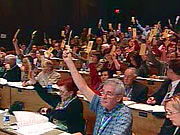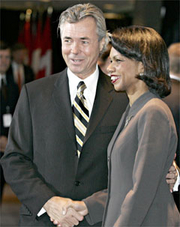MEET
WITH
GOD |
FRAN
- GLO - GIBWÉ
|
RENCONTRER
DIEU |
 |
Un Québec souverain aurait sa propre armée
(2005-oct-29)
Radio-Canada.ca
: Les militants du Bloc québécois, réunis
en congrès à l'Université de Montréal, samedi,
ont voté en faveur de la création d'une armée québécoise
si le Québec devient souverain. Les bloquistes estiment que les
Québécois seront plus enclins à voter en faveur de
l'indépendance si le projet souverainiste est bien étayé,
y compris sur le plan militaire. « Pourquoi ça serait ridicule
que le Québec ait une armée? a demandé M. Duceppe.
Ça ne veut pas dire que vous déclenchez la guerre parce que
vous avez une armée. »
|
|
L'armée envisagée par le Bloc québécois serait
de petite taille, comme celles du Danemark et de la Norvège. Elle
interviendrait à l'occasion de catastrophes naturelles, de missions
de maintien de la paix et, s'il le faut, de conflits armés. Les
militants bloquistes proposent de récupérer les installations
fédérales actuelles pour établir les futures forces
québécoises. Ainsi, le quartier général de
la future armée québécoise serait établie à
Saint-Jean. La garde côtière québécoise se trouverait
à Québec et en Gaspésie, l'armée de terre à
Valcartier, et l'armée de l'air à Bagotville.
|
Gilles Duceppe pense que les militaires
seront ouverts à cette idée. « Il y a bien des gens
qui sont devenus souverainistes dans l'armée canadienne! »
a-t-il ajouté. Le ministre Jean Lapierre, lieutenant québécois
du premier ministre Paul Martin, a immédiatement tournée
en ridicule le projet bloquiste. « [M. Duceppe] a juste à
regarder les résultats des votes des soldats, puis il va s'apercevoir
que ça [l'armée] ne les a pas rendus souverainistes "pantoute".
Ces gens sont commis à la défense du Canada. »
Lors de ce congrès, Gilles Duceppe doit également être
soumis à un vote de confiance. Les résultats seront connus
dimanche. |
|
Rice charms and chills (2005-Oct-26)
As she warns Canada to negotiate softwood
impasse
OTTAWA (CP) - U.S. Secretary of State Condoleezza
Rice hadn't even left town Tuesday afternoon before the righteous
indignation of the Liberal government started anew. Rice wrapped up a 22-hour
visit to Canada - the first in her role as America's top diplomat - with
cordial words but nary a sign of any give on some of Canada's key bilateral
complaints. She assured Canadians that the word of the United States is
"as good as gold" but straight-armed demands for the immediate return of
$3.5 billion in contested softwood lumber duties.
"It's extremely important not to speak in apocalyptic language about
this issue," Rice told a news conference, warning that the rhetoric
- if not the softwood dispute itself - could harm wider Canada-U.S. relations
to the detriment of both countries. She reiterated the U.S. position that
Canada must return to the negotiating table on softwood. |
|
Rice also politely reminded Prime Minister Paul Martin that her country
is already deeply involved in combating the illegal trade in firearms across
the border. Behind closed doors, she flatly rejected Martin's new assertion
that the Americans are to blame for rising Canadian gun crimes. Rice's
unmistakable diplomatic message: Washington is staying the course, so
chill out, Canada. Canada's unmistakable rejoinder: The U.S. can't
flout the North American Free Trade Agreement on softwood lumber and expect
Canada to let it pass.
"We're going to have disputes," Rice told a news conference, flanked
by Foreign Affairs Minister Pierre Pettigrew.
But softwood lumber, she said, "is not the only issue in the U.S.-Canada
relationship and it certainly should not be an issue that somehow is allowed
to undermine our very good working relationship on a whole host of issues."
A working dinner Monday evening at 24 Sussex Drive constituted the
heart of the diplomatic mission. Sources said it was a bare-knuckle exchange,
with Martin aggressively pressing Canada's softwood case and Rice pushing
right back. The subtext of Rice's warning against "apocalyptic" rhetoric
was that Americans have let bygones be bygones on Canada's rejection of
the continental missile defence program, for example, and it may be best
to let sleeping dogs lie. There is no evidence Rice's message found a receptive
audience.
She was still wrapping up her visit at the U.S. embassy when Martin rose
in the Commons, a short city block away, to respond to Conservative questions
on the softwood file. "We will not negotiate a
win," Martin thundered, "and we will
not negotiate unless we have signs that, in fact, NAFTA will be respected."
Outside the House, International Trade Minister Jim Peterson
responded with sarcasm to Rice's "good as gold" pledge on respecting international
agreements. "We've been off the gold standard for an awfully long time
in this country," said Peterson. Asked if he detected any softening
of Washington's intransigence in the softwood impasse, Peterson was blunt.
"No, she did not indicate they were going to be moving off that position."
And he also didn't shy away from linking the softwood impasse to other
trade sectors, although he refused to mention oil and gas by name.
Peterson said that at Monday's dinner, "it was
made very clear that we need the NAFTA to be respected and that this is
an issue that is greater than softwood, that involves the entirety of our
trade that is covered by NAFTA." The top adjudication panel
of the North American Free Trade Agreement has ruled that $3.5 billion
in tariffs and duties collected on Canadian lumber entering the U.S. were
not justified. Another $1.5 billion collected by Washington is also expected
to be found off-side. Rather than return the money, the Bush administration
- citing a ruling by the World Trade Organization that supported the
U.S. stance - has responded that Canada must sit down and negotiate
an end to the impasse. Softwood wasn't the only issue of substance, but
it dominated. Pettigrew and Rice, between them, listed no fewer than nine
separate international issues they discussed Tuesday during a meeting that
lasted little more than an hour.
Les investisseurs à l'heure des changements
climatiques (2005-oct-05)
Ils tiennent de plus en plus compte du bilan
environnemental des entreprises avant d'y investir
par
Suzanne Dansereau (LesAffaires.com)
De plus en plus d'investisseurs institutionnels font le lien entre changements
climatiques et investissements. Ils reconnaissent que les facteurs liés
aux changements climatiques ont une incidence sur la performance financière
à long terme des entreprises dans lesquelles ils investissent. Et,
de plus en plus, ils demandent aux entreprises de divulguer leurs émissions
de gaz à effet de serre (GES), ce qu'elles font pour les réduire,
et combien cela leur coûte. C'est ce qu'on a pu constater lors du
Forum Tremblant, un événement organisé le 15 septembre
par le cabinet de relations publiques National et au cours duquel une centaine
de participants - gens d'affaires, consultants, fonctionnaires et dirigeants
d'ONG - ont discuté de responsabilité sociale et de développement
durable.
Ainsi, les participants ont pris connaissance d'une initiative internationale
appelée Carbon Disclosure Project
(CDP). Il s'agit d'un groupe d'investisseurs, parmi lesquels Merrill Lynch,
Credit Suisse et BMO Groupe financier, qui sondent les 500 plus grandes
entreprises de l'index Financial Times (FT500) sur leurs plans de réduction
de GES et autres questions environnementales. Lors de sa création,
en 2003, le CDP ne comptait que 35 signataires. Aujourd'hui, ils sont 143,
assureurs, caisses de retraite et autres, dont l'actif sous gestion totalise
20 billions (milliers de milliards) de dollars américains. Le Carbon
Disclosure Project publie un rapport bisannuel dans lequel il divulgue
les informations recueillies et classe les entreprises. Dans son dernier
rapport, General Electric s'est mérité la palme d'or. Par
contre, le CDP n'obtient pas toujours ce qu'il cherche. Seulement 54 %
des sociétés du FT500 ont accepté de divulguer leurs
émissions de GES. Soit dit en passant, Microsoft fait partie
de ce groupe.
Il reste donc beaucoup à faire pour que la valeur boursière
d'une entreprise soit liée à sa performance environnementale,
a indiqué Simon Thomas au Forum Tremblant. M. Thomas dirige Trucost,
une société de recherche de Londres qui aide les entreprises
à comptabiliser leurs coûts environnementaux. Il a expliqué
qu'on en était aux premiers balbutiements pour mesurer avec exactitude
les coûts, les calculs et les normes variant énormément
d'une entreprise à l'autre. "Dans le seul rapport du Carbon Disclosure
Project, on répertorie neuf systèmes de normalisation",
a-t-il dit. Et les entreprises rapportent leurs calculs de façon
à éviter les comparaisons.
L'information difficilement accessible
Mais la tendance est là. Sauf que l'information n'est pas si facilement
accessible, a déploré Jean McNeil, membre du comité
de retraite du Fonds de retraite de l'Université de Montréal.
"Nous sommes sensibles à cette question et voudrions en tenir compte
dans nos placements, mais nous ne sommes pas toujours capables de faire
les liens nécessaires et d'obtenir de l'information neutre",
a-t-il expliqué. En Angleterre, une nouvelle réglementation
oblige les entreprises à rapporter l'impact de leurs pratiques sur
l'environnement. En outre, le gouvernement de Tony Blair oblige les caisses
de retraite à divulguer si elles tiennent compte ou non du facteur
environnemental dans leurs placements.
Au Canada, le gouvernement fédéral s'apprête à
réglementer les émissions de GES des grands émetteurs
industriels, dans le cadre de son engagement face au Protocole
de Kyoto. Cette réglementation
aidera les investisseurs à mieux connaître la performance
environnementale de ces émetteurs, qui seront alors incités
à divulguer leurs coûts d'application du Protocole, a indiqué
le ministre de l'Environnement, Stéphane Dion, lors de la conférence.
Comme l'a dit Julie Desjardins, conseillère indépendante
de l'Institut canadien des comptables agréés
(ICCA), "on ne peut pas gérer ce que l'on ne mesure pas". Précisant
qu'elle ne parlait pas au nom de l'ICCA, Mme Desjardins a plaidé
pour une meilleure divulgation du bilan environnemental dans les bilans
financiers des sociétés canadiennes inscrites en Bourse.
Selon elle, l'information pertinente devrait être divulguées
dans la section des rapports annuels intitulée Commentaires et analyse
par la direction des résultats et de la situation financière.
Omettre de le faire est illégal, mais malheureusement, les autorités
des valeurs mobilières au Canada et aux États-Unis n'appliquent
pas assez sévèrement la loi, a-t-elle déploré.
En Ontario, les actionnaires disposent d'un autre outil : à compter
du 31 décembre 2005, ils pourront poursuivre les entreprises, les
membres du conseil d'administration et les hauts dirigeants pour fausse
représentation si des renseignements pertinents ne sont pas rapportés
en temps opportun. Mme Desjardins espère que ces facteurs inciteront
les entreprises polluantes à mieux gérer les risques
financiers associés aux changements climatiques. Mais
elle voit encore des obstacles : dans leurs divulgations, les entreprises
mettent par exemple l'accent sur les renseignements que veulent avoir les
analystes des maisons de courtage. Or, ces derniers ne s'intéressent
pas aux changements climatiques : ils pensent à court terme. Il
revient donc aux gestionnaires de fonds d'exercer des pressions, selon
elle. Il faudrait aussi modifier le mode de rémunération
des hauts dirigeants pour les obliger à penser davantage au long
terme. Alors là, dit-elle, ils seraient plus conscients de l'impact
des changements climatiques sur leur entreprise, leurs opérations,
leurs employés et le lieu où ils sont situés.
KATRINA, LES CHANGEMENTS CLIMATIQUES ET LES INVESTISSEMENTS
"Katrina est en partie une affaire de changements climatiques et en
partie une affaire d'investissement", a affirmé la comptable
Julie Desjardins lors du Forum Tremblant. "C'est une affaire d'ouragans
qui semblent encore plus fréquents et plus intenses qu'auparavant.
C'est aussi une histoire d'investissement ou, plus précisément,
de décision de ne pas investir dans un système de digues
pour protéger la population et l'environnement de la Nouvelle-Orléans",
a-t-elle dit. "Ces investissements, qui étaient
nécessaires avant la tragédie, semblent bien maigres maintenant
comparativement aux vies emportées, aux écosystèmes
ravagés, aux infrastructures démolies, aux biens perdus,
aux usines et installations détruites, aux bénéfices
d'entreprises envolés, a-t-elle expliqué.
"Dans ce triste contexte, la question est : comment encourager nos organisations
à faire des investissements à long terme pour agir face aux
changements climatiques ?" C'est la question que se posent de plus
en plus les décideurs du milieu des affaires et des gouvernements,
selon Mme Desjardins.
Tous droits réservés
: © Médias Transcontinental S.E.N.C.
| Canada swears in first black governor-general (2005-Sep-27)
OTTAWA (AFP) - Haitian-born journalist Michaelle
Jean became Canada's first black governor general after renouncing
her French passport to take up the prestigious post as representative of
the British monarchy in its former colony. Jean, 48, her makeup smudged
by tears during a musical welcome, was sworn in as Canada's 27th de facto
head of state in the Senate chamber. She takes over from Adrienne Clarkson,
who was born in Hong Kong and was the first Asian to hold the post. The
appointment of the woman whose family fled Haiti's murderous Duvalier regime
in 1968, was widely acclaimed throughout the country, though it was not
without controversy.
Jean studied literature and languages and worked for Radio-Canada and its
English-language equivalent, the CBC. "We are encouraged to believe
that everything is possible in this country and my own adventure represents
for me and for others a spark of hope that I want kept alive for the greatest
number," Jean said at her inauguration. Her story of a "little girl,
who watched her parents, her family, and her friends grappling with the
horrors of a ruthless dictatorship, who became the woman standing before
you today, is a lesson in learning to be free," she said.
Canadian Prime Minister Paul Martin called her life "as profound an
expression of what it means to be Canadian as any story (she) reported
on". Detractors have alleged however that Jean had ties to Quebec separatists
and her dual French citizenship made her a poor choice to represent the
monarchy in Canada. |
 Photo Reuters
Photo Reuters |
Last month, a separatist publication alleged that Jean's husband, French
filmmaker Jean Daniel Lafond, had strong separatist convictions and linked
him to former members of the Front de Liberation du Quebec (FLQ), a group
believed responsible for the assassination of a Quebec minister in 1970.
A documentary made by Lafond in 1991 about the struggles for independence
in Quebec, Haiti and Martinique showed the couple joining separatist sympathisers
in a toast to Quebec's independence.
Martin, who appointed Jean, called the controversy a "smear campaign" by
hardcore separatists. Jean denied that she or her husband had ever been
members of a separatist party. "I want to tell you unequivocally that
both (my husband) and I are proud to be Canadians and that we have the
greatest respect for the institutions of our country," Jean said recently.
"We are fully committed to Canada." Further complicating matters, Jean
held French citizenship through her marriage to Lafond, who left France
in 1974.
Newspaper editorials questioned whether a French citizen could represent
Queen Elizabeth II and she renounced her French passport last week. Samuel
de Champlain founded New France on the shores of the St. Lawrence River
in 1608 and later became the first French governor. Britain took over the
colony in 1760, a year after winning the battle of the Plains of Abraham
near Quebec City. Outgoing governor general Clarkson, 66, also a former
journalist, recently underwent emergency surgery and was fitted with a
heart pacemaker.
Government officials said they hope Jean will electrify Rideau Hall, the
official residence of the governor general, where she will live with her
husband and their adopted six-year-old daughter Marie-Eden. Clarkson was
praised for expanding the duties of the governor general, but vilified
for her lavish spending and frequent trips abroad to promote Canadian culture.
Canadian Heritage Minister Liza Frulla compared Clarkson and Jean: "One
was like the Queen, the other more like Lady Di."
Although the governor general's role has become mostly symbolic, Jean may
be called to dissolve Parliament if Martin's minority government loses
a vote of confidence in the House of Commons. Clarkson's five-year term
was extended by one year because lawmakers sought to maintain some stability
and her experience in the position was considered invaluable during political
uncertainty.
GOD
vs BUDDHA
|
camboDIATRIBE
|
COURRI@L
2005
|
AUTRES
SITES KHMERS
|
KUN
PIMOJ 's HOMEPAGE
|
PHN@M-P@NH-P@TINS
|
FRAN-GLO-GIBWÉ
(
PREVIOUS )
|
CANADA
3 FOUNDERS
|
MES
EMAILS 2003
|
THE
6 COMMANDMENTS
|
MEET
WITH GOD
|
PEN Nearovi, Montréal, Québec, Canada
(nearovi@sympatico.ca)




